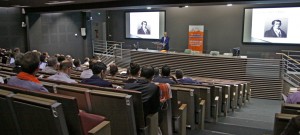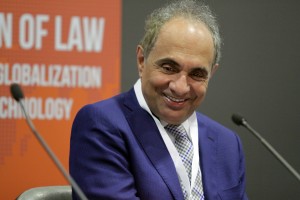On September 18, 2014 CLI co-director Mario Rizzo of NYU’s economics department was the opening keynote speaker at the European Association for Law and Economics annual conference. CLI director Richard Epstein was the keynote speaker at the same organization’s meeting in Warsaw in 2013. Professor Rizzo started the conference in Aix-en-Provence, France with a talk on “Jean-Baptiste Say and His Ideal of Globalization for the 21st Century.” J-B. Say was a great early 19th century French liberal economist who believed that the growth of free international trade would increase the likelihood that nations would develop peaceful relations with each other. After the disastrous Napoleonic wars, many intellectuals turned their attention to the institutional prerequisites for international peace.
 Professor Rizzo described Say’s ideas in some detail and then turned to the modern empirical evidence on the proposition that more trade means a greater chance of peace. Evidence from post-World War II seems to support this proposition, subject, of course to some caveats. War and other conflict interfere with trade and its mutual gains. When the gains from trade are extremely unevenly divided, however, then the party who gains little may find itself not so worried about potentially losing a trading partner. But, overall, trade does seem to causally reduce interstate conflict (in other words, the relationship goes mainly from trade to peace rather than from peace to trade.) Beyond that, some research has concluded that interdependencies of monetary and asset markets are even more conducive to peaceful relations. There are no guarantees in all this – but, nevertheless, raising the even chances for peace is a good thing. Trade and financial interdependence may be one of the best tools we have to promote international peace.
Professor Rizzo described Say’s ideas in some detail and then turned to the modern empirical evidence on the proposition that more trade means a greater chance of peace. Evidence from post-World War II seems to support this proposition, subject, of course to some caveats. War and other conflict interfere with trade and its mutual gains. When the gains from trade are extremely unevenly divided, however, then the party who gains little may find itself not so worried about potentially losing a trading partner. But, overall, trade does seem to causally reduce interstate conflict (in other words, the relationship goes mainly from trade to peace rather than from peace to trade.) Beyond that, some research has concluded that interdependencies of monetary and asset markets are even more conducive to peaceful relations. There are no guarantees in all this – but, nevertheless, raising the even chances for peace is a good thing. Trade and financial interdependence may be one of the best tools we have to promote international peace.

